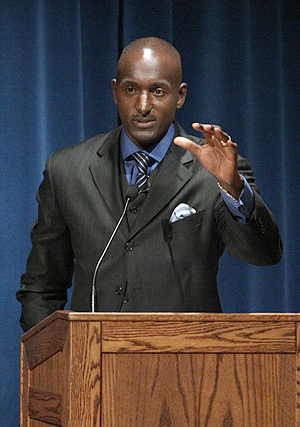‘Apprentice’ winner Randal Pinkett speaks to students

Randal Pinkett, season four winner of “The Apprentice,” speaking to students in the Kiva on Feb. 15. Collegiate Business Association, along with Undergraduate Student Government, organized the event for Kent State students. Photo by Coty Giannelli
February 16, 2012
Microsoft, Dell, Google, YouTube, Facebook, Nike, Pizza Hut, Subway and the list goes on. All of these successful companies were founded by student entrepreneurs.
“But I’m not here necessarily to tell you that you need to go out and start a business,” Randal Pinkett said. “…If you want to compete in the 21st century, you don’t have to start a business, but you’ve got to be able to think like an entrepreneur.”
Pinkett is the season four winner of Donald Trump’s “The Apprentice” and chairman and CEO of BCT Partners, a multimillion-dollar management, technology and consulting firm. He spoke to Kent State students in the Kiva Wednesday night about entrepreneurship and thinking like an entrepreneur.
Pinkett said there are five main characteristics that constitute an entrepreneur’s mindset: creativity, resourcefulness, courage, resilience and passion.
“I believe that when you are able to think like an entrepreneur and embody these characteristics that you can survive, if not thrive, under any circumstance,” Pinkett said.
Pinkett is the author of the book “Campus CEO: The Student Entrepreneur’s Guide to Launching a Multimillion-Dollar Business.”
He said that for the book he interviewed dozens of successful student CEOs. His research led him to find that while two-thirds of students say they want to own a business, 90 percent of their teachers don’t know how to do it.
“Having an appreciation of what it means to think like an entrepreneur is not necessarily something that you get from the classroom,” Pinkett said.
Regardless, he said students naturally embody the creativity and resourcefulness it takes to be an entrepreneur.
Pinkett divided the audience into three groups: employees, new entrants and entrepreneurs.
Employees, he defined, as those who will eventually work for a company. He said even those non-entrepreneurs should think of their career as a private business.
“Whatever job you pursue, own it as if it were your business,” Pinkett said. “Take responsibility for it.”
He defined the new entrants as those looking for their first jobs. To them, he addressed three myths about entrepreneurship.
The first myth was that starting a business has too many risks.
“I’ve got news for you,” Pinkett said. “Working a job today is risky.”
Second, it’s a myth that to start a business somebody else has to invest in the company, he said.
“The fact of the matter is, in 80 percent of businesses, they start with money from the founders,” Pinkett said.
And third, he said, you don’t necessarily have to have a lot of money to start a business.
“One out of every 10 fast growing businesses started with $1,000 or less,” Pinkett said. “I was in the category of ‘or less.’”
Pinkett said the reality of starting a business is starting with a little bit of money and having to be resourceful.
Finally, Pinkett addressed the entrepreneurs emphasizing the importance of building a strong team behind a company and learning to have a healthy acceptance of failure.
“Failure is right along the road to success,” Pinkett said. “If you want to walk the road to success, you’re going to trip over failure at some point.”
Demetrius Stevenson, freshman accounting major, said Pinkett was an empowering speaker.
“He pretty much gave me hope for if accounting doesn’t work out,” Stevenson said.
Stevenson said he also could relate to Pinkett’s message about teamwork.
“I’ve come to find that I’m not really a task oriented man,” Stevenson said. “I’m not very good with deadlines and all that stuff, but with that, having team members that could help keep that drive and keep on schedule makes a whole lot of sense to me.”
Kent State’s Collegiate Business Association sponsored the event. Marcus Henderson, the CBA student adviser, said the $13,300 cost was funded by Undergraduate Student Government.
“He’s really just not one of those pyramid scheme type guys,” Henderson said. “He’s just really self made.”
Contact Lyndsey Sager at [email protected].























